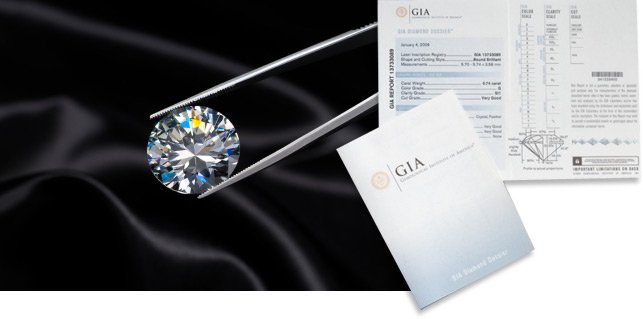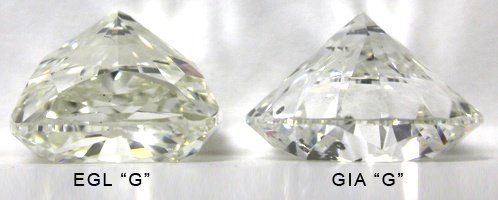
I bargain everywhere.
Shamelessly.
My wife loves micro cars like the Fiat 500 and Daihatsu Copen. So, when she fell pregnant about 2 years ago her lifelong crush on micro cars had to take a backseat. She needed a car (with a backseat) that could fit the mountain of cargo a baby travels with. If you’re not a parent; you’ll be surprised to see how much luggage a 50cm human needs. More room than that cute Fiat has to offer.
After some good research we picked one of BMW’s most popular models… and I negotiated a 22% discount on a brand new car, just before a price hike. I don’t think that dealership is particularly proud of the transaction, but if you send me an email I’ll gladly put you in touch with John.
This is not a car blog. Please get back to engagement rings…
Buying an engagement ring is always a relatively large purchase.
We’ve had gents swiping their cards and breaking into a sweat while mumbling “this is by far the most I’ve ever swiped.” We’ve also fascinatingly seen “APPROVED” pop up after some people pay apartment prices for jewellery. Good times.
I completely understand the weight of the moment.
You and I both worked hard for our money, and before I’m parting ways with any of mine I want to know this is the absolute best deal… all things considered.
*For the sake of full transparency; I’m sure quite a few readers were drawn to this article for the sole reason that if we didn’t discount their ring… why are we giving negotiation tips? We’re big fans of best price first time ‘round. We’ll circle back to our approach. Please stick around.
Let’s get fake “sales” and “discounts” out of the way.
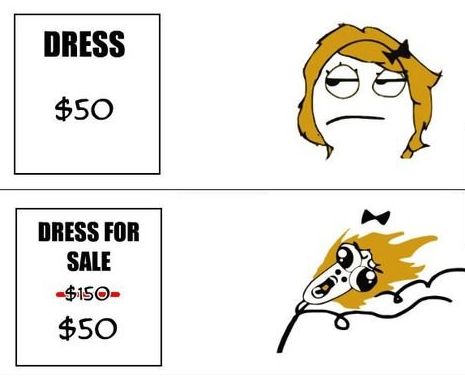
You can try the following at every single high-end mall jeweller and you will succeed to get a discount without fail.
Walk into the store, point to anything, ask the price and then ask “what’s the best price”.
Huge immediate discount.
Even if you don’t deliberately ask for their best price the consultant will without fail tell you she can give you a 30% discount because of the sale they’re running.
*Sales tip: A smart sales person will at least fake a manager chat.
That’s not the type of negotiation we’re going to be talking about. This whole issue is called fictitious and deceptive pricing and it’s actually illegal in a few countries.
So, before you get goosebumps when a sales consultant offers you a massive discount on the spot – everyone gets that discount. No one is buying at their sticker price. It’s just a bloated number to encourage bargaining which they then meet with massive on the spot discounts they use to pressure you into seizing this “once in a lifetime opportunity”.
One study showed that 63% of retailers in the USA were on sale for the whole of 2016. Come on.
Google “deceptive pricing lawsuits” and you’ll see some very high end names popping up; JCPenney, Kohl’s, Sears, Macy’s. The whole issue of deceptive pricing is almost exclusively used at higher end stores to lure in new customers that just walked by all the years. Suddenly it’s all “50% off” – what a great opportunity. Unfortunately, these shoppers were all new to these brands and department stores. Since these unsuspecting and excited visitors have no idea what the normal base prices where previously these stores can inflate “normal prices” to whatever they want and simply “discount” to what they’re willing to sell it at. It’s a super interesting topic to research.
It’s also sleazy, triple distilled rubbish.
All these brands have suffered irreparable reputational damage. I’m also sure the court rulings will be severely punitive in nature.
Stage 1: Gather quotes.
If, for some inexplicable reason, you don’t just talk to us directly and get the best value deal, gather a few quotes from reputable jewellers.
Google has done most of the work for you by ranking businesses based on thousands of variables.
Simply Google “engagement rings johannesburg” or “engagement rings (your town)”.
Skip the “I swear it’s wholesale, we’re the cheapest in the world, 90% off” paid ads and reach out to the businesses that Google knows are the best fit.
Anyone can pay to advertise in those ad spots.
You’ll most probably find us snuggling up at #1 in the organic rankings… for very good reasons, if I might add. Sorry, I’m obviously biased.
Luckily Google isn’t.
When asking for a quote specify exactly what you’re looking for to ensure the quotes are relatively comparative in nature. I’ve been in this trade for 10 years and I still have a hard time deciphering quotes to get them to a set baseline.
Your Main Diamond Request
When it comes to the diamond’s specification it’s important to know that not all grading laboratories are equally strict on their grading standards. Select your prefered colour, size and clarity and ask to be quoted on GIA certified diamonds. The Gemological Institute of America (GIA) is without a doubt the most prominent and consistent grading laboratory in the world. The lack of standardisation in the diamond grading world is a prickly pear. We’re not going to bash inferior grading laboratories – we just need apples to compare to … apples.
If a jeweller doesn’t stock GIA diamonds it doesn’t make them shady or criminal. Even if you aren’t planning to spend the price of a nice apartment on a ring, you want a jeweller who defaults to proper GIA certified diamonds.
Just know that the same colour grading, for example “G”, might not be the same shade if the grading laboratories differ.
*This is an extreme example. Some of the worst EGL grading laboratories have closed due to very well deserved bad press and lawsuits. EGL-laboratories are mostly franchises which makes standardisation even more tricky. You’ll hear arguments like “these compromised laboratories have been closed for more than a year”. That’s wonderful, but it doesn’t take these worthless grading certificates off the market. There was no recall of any sort. They’re still floating around.
Tip: If a non-GIA diamond stands out to you, ask to see it next to a GIA certified diamond of the same colour. You’ll be able to see if the colours differ. Checking if the clarity grading is correct would be impossible if you don’t know diamonds well.
Metal Request
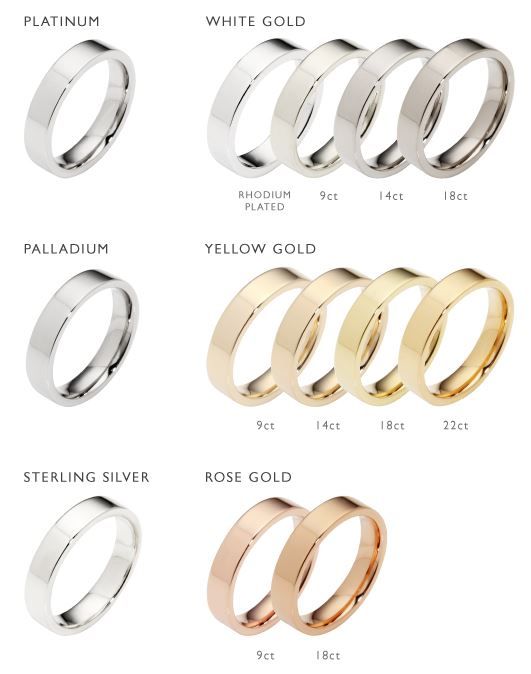
Even if you don’t intend to purchase the ring in platinum, state that’s your metal of choice. All proper jewellers manufacture in platinum. This is a great way to shortlist higher-end jewellers and eliminate discount jewellers who focus exclusively on the low end of the budget spectrum by offering 9kt or 14kt gold options.
If your budget doesn’t stretch to platinum you can always opt for it’s more affordable twin –palladium. It’s a great metal choice. Palladium is part of the platinum group of metals; strong, durable, stunning colour, no plating needed. The only difference is it’s substantially lighter in weight. If a ring weighs 10 grams in platinum you’ll be looking at 6 grams in palladium. It’s also cheaper per gram with further drives down the price. It’s very tricky to work in so many jewellers will say they’ve had a terrible experience with the metal. It’s “porous”, “brittle” etc. They’re not lying. That’s exactly what happens if you don’t know how to work in palladium. Japanese Wagyu Rib Eye is the best steak in the world. Say you find a local butcher that sells it and ecstatically drive over to buy a 300gram slice of pure joy. Back at home you have no idea how to prepare it so you decide to chuck it straight into a 1 meter high raging fire for 2 minutes. You dish it up – no veggies this time, purist. First bite – ugh, horrible! It’s like eating flaky charcoal with a raw meat centre. In this scenario would you come to the conclusion that Wagyu rib eye is horrible and everyone is lying? Nope. You’re just incredibly bad at preparing meat. Now, in a perfect world jewellers would just say “sorry, we can’t do any palladium manufacturing”. In the real world they’re 100% disconnected from the fact that palladium is too tricky for them. They just say it’s terrible because they have no idea how to “cook” it. Palladium is awesome when properly prepared.
Back to platinum.
Working in platinum is trickier than white gold and silver manufacturing. You need dedicated equipment, and very skilled goldsmiths. No business will have an apprentice work on their platinum rings – it takes years to master. A business that does proper platinum work has to have a highly skilled workshop, there’s no other way.
Unfortunately, a few jewellers that do terrible platinum work (we show an example a page or so down…) insist that they’ve mastered the metal. During your visit to their store or studio ask to see some platinum work they have recently finished. You’ll be surprised to see how few jewellers actually have any platinum work on their premises.
Wait for the quotes.
Try not to read too much into the reply time. Slowish feedback is a symptom of being lazy… or really busy. Fast feedback is a symptom of lack of work… or a well oiled machine.
Stage 2: Shortlist 2 – 3 jewellers you feel comfortable working with.
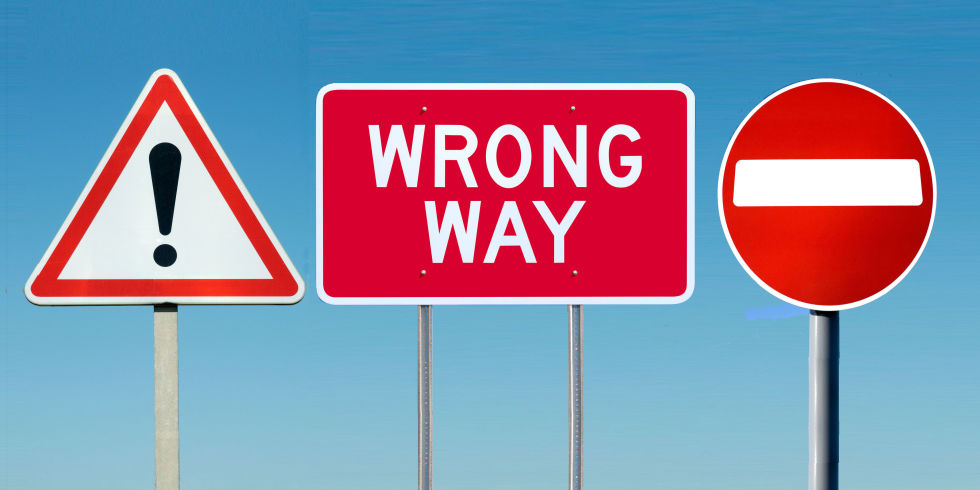
Jewellers should get back to you within a business day or two. If a quote trickles in 5 days after your query, give them a pass unless they offer a valid and reasonable explanation. But then again, do you really want to start this process with excuses from a jeweller? Don’t sign up for a draining apology marathon.
After you’ve eliminated jewellers that can’t work in platinum and/or don’t default to GIA (you asked for GIA) here are a few more issues to help shortlist jewellers:
- A diamond is a specific colour and clarity. If anyone quotes on a vague range like J/K (J is whiter than K), VS1/VS2 (VS1 has less impurities than a VS2), GIA/HRD “nope them”. Generally speaking a J VS1 costs 35% more than a K VS2. Whether you’re buying a 0,70ct diamond or a 2ct diamond that’s a significant difference in price. Quoting in ranges is only due to one of two red-flag issues; a.) the jeweller doesn’t carry diamond stock and will hit the phone to call around for J/K VS1/VS2 diamonds looking for the cheapest option that might be a compromised diamond. b.) You’re getting the lower colour and clarity but the quote looks great stating the possibility of the higher specification.
- You’ll find jewellers who dodge the GIA request like a bullet. When someone starts dancing around that request, assume they’re not quoting on the requested GIA specification.
- Visit their social media pages and check for fan engagement. There are companies that literally sell fans on Facebook. Don’t be amazed by 50 000 followers. Take a look at how many people actually like and share their photos and blog posts. If any company bought 50 000 followers you’ll see very low engagement. Those 50 000 followers are dummy accounts that don’t like and share content. Our 54 000 fans actually liked our page and that’s why you’ll see 1 000 or so likes per photo/blog. Sometimes up to 3 000. If you see 50 000, 30 000 or even 100 000 fans and only single digit “likes”, that’s grandma, dad’s new wife, the 3 people who work there’s friends etc.
- Look for complaints online. Search around and see if people are complaining about the business on any platform. Facebook complaints are easy to delete, and you can simply ban the unhappy customer from your Facebook Business Page. But… you have to actually read the complaints to see if there is a real issue. Some people are just super thin-skinned and will complain about anything. Nutella is the only business that can keep everyone happy 24/7 without fail.
- WhatsApp. Proper businesses use proper communication channels. Sending quotes and information via WhatsApp is the digital equivalent of fist-bumping everyone you meet at a funeral.
- Quotes you didn’t request. I reach out to other jewellers about once per month under an alias to check levels of service and to a lower degree, pricing. Some jewellers trade under more than one name so I usually receive more quotes than requested. Ensure the quotes you review are from companies you contacted. These Blah-Blah Trading as Whatever quotes can actually be from the very same jeweller you dismissed on the issues discussed in this post. Don’t deal with ghosts.
- Jewellers that recklessly bad-mouth other jewellers. Imagine you’re stranded on a remote island with 10 people. Months go by and there is obviously no search party heading your way. One day you’re sitting under your coconut tree, sipping on some fresh cold water from the stream, when you decide that it’s time to make peace with the island life and move on. “Dating” seems like an odd concept, but having a steady partner will be great. Bob and Shaun have a thing going, but the 5 ladies on the island are all still single and ready to mingle. You’re great at fishing, have a good tan going and you always win the baboon fighting competition. You’re a pretty big deal on this island. You take each one of the ladies to your favorite waterfall and talk about the previous life you disappeared from, what snacks you miss from back home and what matters to you in life. After a few of these picturesque dates you realise that you don’t know anything about Sarah. She uses your date time exclusively to bad-mouth the other 4 ladies. Instead of finding out if you’re a good fit for her she just bashes everyone. She claims that she doesn’t even know Karen is on the island. Passive Aggressive 101. Sarah will not be a great partner. The right partner will make you feel at home with her, instead of just awkward and disgusted by everyone else. SNAP – we’re back at home reading this blog. Find a jeweller who wins you over on respect, quality, service and transparent pricing. It’s easy to sit and bash every other jeweller all day long – it’s much harder to actually be a great jeweller.
- That silly price match guarantee. I’m sure you’ve seen the ads internet wide where a jeweller promises you cold hard cash if they can’t beat your best written quote. Those ads give you a glimpse into the workings of that whole business. Do you think your ring will be manufactured in any way other than the absolute cheapest route? How can any jeweller categorically state they can manufacture any item cheaper than everyone else? We work with hundreds of couples per month and a few times per year someone sources a diamond at a ridiculously good price. Beter than anything we can offer. It’s rarely from another diamond dealer. Engagements do get called off and usually the ring carries a heavy emotional weight. In a lot of cases the gent wants to get rid of the ring as soon as possible and will often sell it off at a fraction of what he paid. Splitting the diamond purchase from the jeweller is generally a bad idea for reasons you’ll find HERE. A decent jeweller is obsessed with quality and detail – not with cutting corners and cash. We’ll tackle quality in the next segment.
- Visit the jeweller. Are the phones ringing? How many people are working there? Sitting around doesn’t count. You should stick around long enough to get a feeling for the place. Ask to see some samples and custom rings that are on their way heading out. Even if you’re not a jewellery expert you’ll spot sloppy work or the obvious lack of any work if they don’t have any rings waiting to be collected and lovingly stuffed onto fingers.
- V.A.T & Cash. You’re welcome to pay cash when you collect your engagement ring. Although we prefer an EFT or a card swipe, cash is legal tender. You’re still getting your Tax Invoice that includes 14% VAT. Any jeweller that sells a handful of rings per year has to be registered for VAT. It’s not optional. With SARS being the best managed government department, why would a jeweller be dishonest with SARS but absolutely crystal clear in his dealings with you?
I can go on and on. Trust your gut and dismiss businesses you feel uncomfortable with for any reason.
Don’t move on to Stage 3 with more than 3 jewellers.
Stage 3: Negotiation.
First of all, note that we haven’t dismissed a single jeweller on price. Even if someone has quoted you 100% more than the average quote we haven’t eliminated them.
The biggest risk when buying an engagement ring is not overspending. If you decide to pay a small premium for a well established brand name it’s probably a great idea. Your biggest risk is choosing the wrong jeweller and buying an inferior ring that will have to be remade. Jewellers are very quick to say any breakage and damage was caused by the person who wore the item. True as it may be, a jeweller who wants to build a lasting relationship will remanufacture the ring at lower rate. I don’t want anyone running around with broken Poggenpoel products. That’s just basic caring.
Whenever someone contacts us for remodelling we always ask why they don’t use the jeweller who initially made the ring. The answer to this question is always some variation of the fact that the quality is obviously terrible and the jeweller is uncooperative and dismissive.
Last year we had a situation where a lady (a customer of ours) accidentally and literally drove over her ring with an automobile. Diamonds are hardy buggers so they were luckily undamaged. We completely remade the ring for around R1 200. I promise you this doesn’t even cover our costs. Why did we remake it for this nominal amount? Goodwill. I know every single time she tells that crazy story she’ll plug our name. She shifted from “Customer” to “Evangelist”. And I love that.
Regardless of what happens to our products, we never walk away from them.
Math time!
Print out your 3 comparative quotes from the decent jewellers you shortlisted.
Work out what the average of the quote is.
- Quote A: R78 000 incl.
- Quote B: R123 000 incl.
- Quote C: R95 000 incl.
The average is around R100 000.
- Add 10% = R110 000.
- Subtract 10% = R90 000.
*This R90 000 – R110 000 is a fair range of pricing for the item you wish to have made.
Personally I wouldn’t fiddle with the R78 000 quote. If all the checks and balances we discussed are in place you’re dealing with a best price – first time ‘round business like ours. That’s a great quote.
Mail the folks who sent over Quote B (R123 000) and Quote C (R95 000) and mention you received a better quote elsewhere. Don’t remotely even hint to what the lowest quote was. Explain that you understand that every jeweller uses a different pricing model, but without sacrificing or changing a single detail on the quote what is the absolute best price they’ll close the deal for. Also ask for any added benefits they offer to customers that you might not be aware of. Free lifetime maintenance, free yearly valuations, exclusive offers. Maybe there’s a list as long as this blog about their value added services. We have a long list ourselves.
While we’re waiting for those final quotes to trickle in let’s run through a major issue jewellery buyers don’t take into consideration when negotiating;
Negotiating on the price of a branded standardised product (a BMW or HP printer) is risk-free. Once you’ve finished your negotiations and settled on the price you still get the same product. The salesman at BMW doesn’t call the factory and hear if they can strip some airbags, make all panels 20% thinner, switch out the engine for a refurbished unit etc.
The jeweller can.
Once a jeweller knows if he drops to R77 900 he has your business you have no idea what cost cutting measures he’s playing around with. Business is tough in 2017 for a lot of jewellers. But since business is tough he needs to make money on this deal. He’s not moving into the red. Can you imagine what a jeweller has to cook up to discount a R123 000 price (not a fictitious price – he trades at that level) to R77 900? If you think you’re still getting that R123 000 ring – you’re wrong.
Next up is an example of a ring we recently remade. To save weight (costs) the jeweller thinned out the structure to a point where a sweater (see the red fibers?) literally ripped open a platinum claw. The jeweller’s feedback to the customer: “Not my problem. You wore it”.
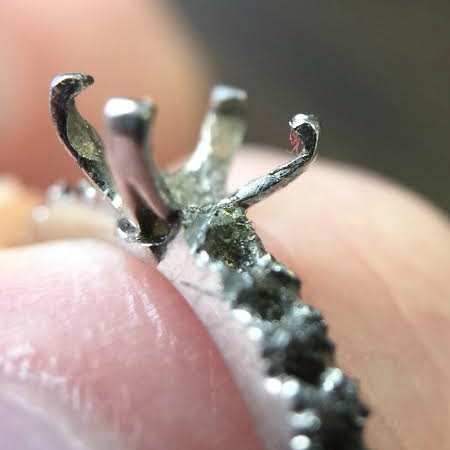
Even take a look at the opposite claw – you can literally see how metal was shaved off.
Terrible.
But a great example to show you to what lengths a jeweller will go to cut cost on your ring.
Great, our (Poggenpoel) reply just trickled in;
“Hi Paul
Unfortunately, we don’t have room to bring down our price. In a trade where jewellers use fictitiously high pricing and then discount we have chosen to be 100% transparent and our best offer first time ‘round.
Although we don’t deliberately try to be the cheapest jeweller I know we often are. Our business model and the volume of sales allow us to work on thin margins. Instead of playing games and testing if you would pay an inflated price we just give you the best price from the first point of contact.
There are always ways to bring down the price of a custom jewellery item;
- Use poor quality small diamonds. (Low clarity, low colour, poor cut).
- Tweak the design to use less metal which can compromise the structure and longevity of the ring.
- Offer an alternative main diamond which isn’t graded by the GIA.
- Allocate less time for labour which can lead to a scruffy product.
- Allow larger tolerances when it comes to quality control.
We’re extremely proud of our work and won’t compromise a single detail, no matter how small, to drive down your quote.
Your design looks stunning as it is, and if you chose to proceed with us I know you’ll be ecstatic when you see the finished product.
Kind Regards
Johan Poggenpoel”
Negotiating on the price of an engagement ring can have a detrimental effect on the quality of the ring. That’s why stages 1 and 2 help you pick decent jewellers with a name to protect. Jewellers can cut a lot of important corners if they desperately need the deal. If a jeweller knows you have a lower quote, you ask them for their best price and they’re still way off your R78 000 quote – there’s no way they can transparently and magically come down to R77 900.
When you have your final quotes in pick a jeweller who walked the extra mile. A business that you’ll gladly revisit for anniversary and birthday gifts. If that includes a fair premium – go for it.
Always keep in mind an engagement ring will be worn all day, every day, hopefully for the rest of someone’s life. You need a proper ring with good aftercare service in place.
Thank you for reading. As always feel free to email me directly on johan@poggenpoel.com
Johan Poggenpoel

